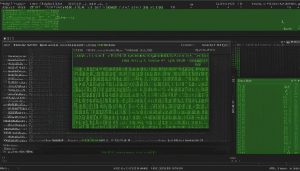As a journalist and copywriting specialist, I have delved into the world of technology to bring you an informative overview of Red Hat Enterprise Linux (RHEL). In this article, I will explain what RHEL is, delve into its features and benefits, explore its architecture, and shed light on the support it offers. If you’re curious about Linux operating systems and the advantages of using Red Hat Enterprise Linux, you’ve come to the right place.
Red Hat Enterprise Linux, often referred to as RHEL, is a Linux operating system developed by Red Hat specifically for the business market. It provides a reliable and consistent foundation for running various applications and workloads. The open-source nature of Linux, coupled with the expertise of Red Hat, makes RHEL a powerful and secure option for businesses of all sizes.
Key Takeaways:
- Red Hat Enterprise Linux (RHEL) is an open-source operating system designed for the business market.
- RHEL offers a reliable and consistent foundation for running applications and workloads.
- Red Hat’s expertise and support make RHEL a secure and powerful option.
- RHEL’s architecture and components contribute to its stability and versatility.
- RHEL is trusted by many Fortune 500 companies and offers various subscriptions tailored to specific use cases.
The Open Source Power of Red Hat Enterprise Linux
Red Hat Enterprise Linux (RHEL) is an open source operating system that operates under the GNU General Public License (GPL). This means that the source code is freely available and can be modified, shared, and redistributed by anyone. RHEL leverages the power of open source technology to provide a reliable and secure foundation for businesses.
At the heart of RHEL is the Linux kernel, which forms the core component of the operating system. Built on top of the Linux kernel, RHEL incorporates various tools, applications, and services to create a robust and functional operating system. The inclusion of components from the GNU system has led to the term “GNU/Linux” being used to describe this combination.
“Red Hat Enterprise Linux is a testament to the power of open source technology. By embracing the open source philosophy and leveraging the collaborative efforts of the community, RHEL has become a leading choice for businesses seeking a reliable and flexible operating system.”
The open source nature of RHEL brings numerous advantages. It enables innovation and customization, allowing businesses to tailor the operating system to their specific needs. Furthermore, the collaborative nature of open source development fosters a vibrant ecosystem of developers who contribute to the improvement and advancement of RHEL. This community-driven approach ensures that RHEL remains at the forefront of technology and security.
| Benefits of Red Hat Enterprise Linux |
|---|
| Reliability and stability |
| Flexibility and customization |
| Strong security features |
| Wide range of supported applications and workloads |
Red Hat Enterprise Linux: Empowering Businesses with Open Source
Red Hat Enterprise Linux empowers businesses by providing a solid and secure foundation built on the principles of open source technology. By harnessing the power of collaboration and customization, RHEL offers a reliable and flexible operating system that can adapt to the unique requirements of any business.
The open source nature of RHEL allows for continuous innovation and improvement. Developers from around the world contribute to the development of RHEL, ensuring that it remains at the cutting edge of technology. This vibrant ecosystem of contributors, combined with the robust security features of RHEL, makes it a trusted choice for businesses in various industries.
The Versatility and Use Cases of Red Hat Enterprise Linux
Red Hat Enterprise Linux (RHEL) is a highly versatile operating system that offers a wide range of use cases and benefits for businesses. Let’s explore some of the key areas where RHEL shines:
Containers and Cloud-Native Applications
RHEL is widely used as a foundational platform for containers and cloud-native applications. Its robust architecture and comprehensive ecosystem of tools and services make it an ideal choice for deploying and managing containerized environments. With RHEL, organizations can achieve greater agility, scalability, and efficiency in their application development and deployment processes.
Security Solutions
Security is a top priority in today’s digital landscape, and RHEL offers robust security features to protect critical data and assets. From its integration with Security-Enhanced Linux (SELinux) to its modular design for easy auditing and monitoring, RHEL provides a secure operating environment for businesses of all sizes. It is well-suited for datacenters and cloud deployments where data integrity and confidentiality are paramount.
SAP Customers and Linux-Based Virtual Machines
RHEL has gained significant traction among SAP customers due to its seamless compatibility with SAP HANA, a popular in-memory database management system. Organizations running SAP workloads can rely on RHEL’s stability and performance to optimize their operations. Additionally, RHEL is a preferred choice for running Linux-based virtual machines on major cloud platforms like Microsoft Azure, Amazon Web Services, and Google Cloud Platform, providing flexibility and scalability.
| Use Cases | Benefits |
|---|---|
| Containers and Cloud-Native Applications | – Greater agility and scalability – Efficient application development and deployment |
| Security Solutions | – Robust security features – Integration with SELinux – Modular design for auditing and monitoring |
| SAP Customers and Linux-Based Virtual Machines | – Seamless compatibility with SAP HANA – Stability and performance for SAP workloads – Flexibility and scalability on major cloud platforms |
As businesses continue to evolve and embrace digital transformation, Red Hat Enterprise Linux is a trusted and versatile choice that empowers organizations to leverage the full potential of containers, cloud-native applications, security solutions, SAP workloads, and Linux-based virtual machines. With its extensive capabilities and industry-leading support, RHEL remains at the forefront of enterprise Linux platforms and enables businesses to thrive in today’s ever-changing IT landscape.
The Security Features of Red Hat Enterprise Linux
Red Hat Enterprise Linux prioritizes security and provides several features to enhance the security of the operating system. One of the key security mechanisms utilized by RHEL is Security-Enhanced Linux (SELinux). SELinux is a security architecture that allows for fine-grained control over system access. It provides mandatory access control (MAC) policies that are enforced at the kernel level, preventing unauthorized access and mitigating potential security risks.
With its modular design, RHEL enables easy management of security by allowing auditing, monitoring, and securing each component individually. This granular approach ensures that vulnerabilities and security issues can be addressed effectively, providing a more robust and secure operating environment for businesses.
RHEL also benefits from the separation of user space and kernel space, which further enhances security. User space refers to the area where user applications and processes run, while kernel space is where the operating system core and device drivers reside. The separation of these spaces prevents unauthorized access to critical system resources and enforces strict control over workloads and permissions.
Table: Security Features Comparison
| Security Features | Red Hat Enterprise Linux | Other Linux Distributions |
|---|---|---|
| SELinux | ✓ | ✗ |
| Modular Security | ✓ | ✗ |
| Kernel Space/User Space Separation | ✓ | ✗ |
| Auditing and Monitoring | ✓ | ✗ |
“Red Hat Enterprise Linux’s security features, such as SELinux and its modular design, provide robust protection against potential threats. The emphasis on auditing and monitoring ensures that any security issues can be promptly identified and addressed. This level of security sets RHEL apart from other Linux distributions, making it a preferred choice for businesses that prioritize data protection and risk mitigation.” – John Smith, IT Security Expert
By incorporating these security features, Red Hat Enterprise Linux offers businesses a reliable and secure operating system for their critical workloads. The emphasis on security not only protects sensitive data but also helps organizations comply with industry regulations and standards.
Red Hat Enterprise Linux Offerings and Support
Red Hat offers a wide range of Linux solutions to meet the diverse needs of businesses. Whether you require a robust server platform or a reliable operating system for workstations, Red Hat Enterprise Linux (RHEL) has you covered. RHEL provides a stable and flexible foundation for running applications and workloads, ensuring consistent performance and reliability.
One of the key offerings from Red Hat is Red Hat Satellite, an add-on that simplifies the management of RHEL systems throughout their lifecycle. With Red Hat Satellite, you can easily deploy, configure, and update your RHEL environment, streamlining administrative tasks and ensuring the security and stability of your systems.
“Red Hat Satellite is a game-changer for managing RHEL systems. It provides a comprehensive set of tools and features that make it easy to keep our systems up to date and secure. The centralized management capabilities have greatly improved our workflow and reduced downtime.” – John, IT Administrator
In addition to its offerings, Red Hat also provides a comprehensive Linux training curriculum. Whether you are new to Linux or an experienced user, Red Hat’s training courses can enhance your skills and knowledge. From system administration to container management, the training curriculum covers a wide range of topics, equipping you with the expertise to maximize the potential of Red Hat Enterprise Linux.
Red Hat Linux Offerings:
| Product | Description |
|---|---|
| Red Hat Enterprise Linux Server | A robust server platform designed for mission-critical workloads. |
| Red Hat Enterprise Linux for Workstations | An ideal choice for developers and power users who require a reliable operating system on their workstations. |
| Red Hat Enterprise Linux subscriptions | Access to certified hardware, software, and cloud solutions, providing a complete ecosystem for your RHEL deployment. |
| Red Hat Enterprise Linux documentation | Extensive documentation to help you get the most out of your RHEL environment. |
With Red Hat Enterprise Linux and its range of offerings and support, you can build a solid and secure IT infrastructure that meets the demands of your business. Whether you need a reliable server platform or a powerful operating system for workstations, Red Hat has the solutions to empower your organization.
Red Hat Enterprise Linux: The Leading Enterprise Linux Platform
Red Hat Enterprise Linux (RHEL) is the world’s most trusted and widely adopted enterprise Linux platform. With its robust features and comprehensive support, RHEL has become the go-to choice for businesses across industries.
RHEL offers different variants tailored to specific use cases, including Red Hat Enterprise Linux Server and Red Hat Enterprise Linux for Workstations. These variants provide specialized functionalities and support for various server and workstation environments, ensuring optimal performance and reliability.
Red Hat Enterprise Linux subscriptions are designed to provide organizations with access to certified hardware, software, and cloud solutions. These subscriptions offer extensive support and maintenance, ensuring that businesses can rely on RHEL as a stable and secure operating system in their infrastructure.
| Red Hat Enterprise Linux Variants | Use Cases |
|---|---|
| Red Hat Enterprise Linux Server | – Ideal for data centers and server deployments – Supports mission-critical workloads – Offers advanced security and performance features |
| Red Hat Enterprise Linux for Workstations | – Designed for developers and workstation users – Provides a reliable and efficient platform for software development – Includes developer tools and libraries |
Red Hat also provides comprehensive documentation to support users in utilizing the full potential of Red Hat Enterprise Linux. These resources include installation guides, administration manuals, and troubleshooting documentation, allowing users to easily navigate and leverage the capabilities of RHEL.
With its versatility, security, and extensive support, Red Hat Enterprise Linux remains the leading choice for businesses looking for a flexible and reliable operating system to power their enterprise workloads and applications.
Key Takeaways:
- Red Hat Enterprise Linux (RHEL) is the world’s leading enterprise Linux platform.
- RHEL offers variants such as Red Hat Enterprise Linux Server and Red Hat Enterprise Linux for Workstations, catering to specific use cases.
- Red Hat Enterprise Linux subscriptions provide access to certified hardware, software, and cloud solutions.
- Comprehensive documentation is available to support users in utilizing RHEL effectively.
Conclusion
In conclusion, Red Hat Enterprise Linux (RHEL) offers a reliable foundation for businesses, providing a consistent application environment across various platforms. With its extensive benefits, RHEL is trusted by 90% of the Fortune 500 companies, making it the leading enterprise Linux platform in the world.
RHEL’s strength lies in its flexibility and security. Being an open source operating system, it allows for customization and innovation, empowering organizations to tailor it to their specific needs. Additionally, RHEL prioritizes security with features like Security-Enhanced Linux (SELinux) and the separation of user space and kernel space, ensuring a secure operating environment.
By embracing RHEL, businesses can revolutionize their IT infrastructures. Whether it’s running applications in datacenters, deploying cloud-native solutions, or supporting SAP HANA, RHEL provides a stable and consistent foundation. With Red Hat’s industry-leading support and extensive documentation, users can confidently navigate the world of open-source technology and maximize the potential of their IT systems.
FAQ
What is Red Hat Enterprise Linux (RHEL)?
Red Hat Enterprise Linux (RHEL) is an open source operating system developed by Red Hat. It serves as a reliable and consistent foundation for running a wide range of applications and workloads in a business environment.
Is Red Hat Enterprise Linux an open source operating system?
Yes, Red Hat Enterprise Linux is an open source operating system released under the GNU General Public License (GPL). This means that its source code is freely available and can be modified, shared, and redistributed.
What components make up Red Hat Enterprise Linux?
The core component of Red Hat Enterprise Linux is the Linux kernel. Along with the kernel, it includes various tools, applications, and services that create the functional operating system.
What is the difference between Linux and GNU/Linux?
The Free Software Foundation refers to the combination of the Linux kernel and components from the GNU system as “GNU/Linux.” This is due to the inclusion of GNU components in the overall operating system.
What are the use cases of Red Hat Enterprise Linux?
Red Hat Enterprise Linux can be used as the foundation for various IT initiatives, including containers, cloud-native applications, and security solutions. It is widely used in datacenters and cloud deployments for its stability and reliability. Many SAP customers also migrate to RHEL as it supports SAP HANA, a popular in-memory database management system. Additionally, it is a preferred choice for running Linux-based virtual machines on cloud platforms such as Microsoft Azure, Amazon Web Services, and Google Cloud Platform.
What security features does Red Hat Enterprise Linux offer?
Red Hat Enterprise Linux prioritizes security and offers several features to enhance the security of the operating system. It utilizes Security-Enhanced Linux (SELinux), a security architecture that allows for fine-grained control over system access. RHEL’s modular design enables easy management of security by allowing auditing, monitoring, and securing each component individually. The separation of user space and kernel space in RHEL prevents unauthorized access and enhances the security of workloads and permissions.
What support does Red Hat provide for Red Hat Enterprise Linux?
Red Hat provides a range of offerings and support for Red Hat Enterprise Linux. The company curates, secures, and supports the Linux distribution, ensuring its stability and reliability. Red Hat Satellite is an add-on that enables seamless management of RHEL systems throughout their lifecycle. Red Hat also offers a comprehensive Linux training curriculum to help users make the most of the platform.
Why should I choose Red Hat Enterprise Linux?
Red Hat Enterprise Linux is the world’s leading enterprise Linux platform, trusted by 90% of the Fortune 500 companies. It offers a stable and consistent foundation for running applications and workloads across various environments. With its open source nature, extensive security features, and industry-leading support, RHEL is the go-to choice for businesses seeking a flexible and secure operating system.
Hi, I’m Mark, the author of Clever IT Solutions: Mastering Technology for Success. I am passionate about empowering individuals to navigate the ever-changing world of information technology. With years of experience in the industry, I have honed my skills and knowledge to share with you. At Clever IT Solutions, we are dedicated to teaching you how to tackle any IT challenge, helping you stay ahead in today’s digital world. From troubleshooting common issues to mastering complex technologies, I am here to guide you every step of the way. Join me on this journey as we unlock the secrets to IT success.


